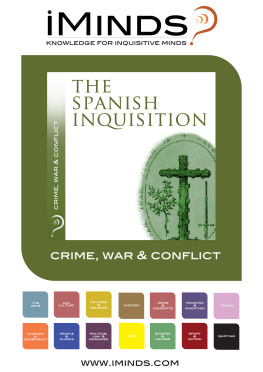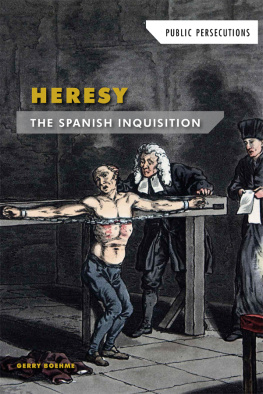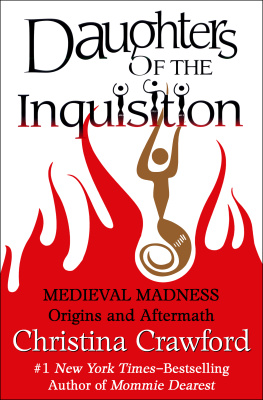The Business of the Roman Inquisition in the Early Modern Era
Established in 1542, the Roman Inquisition operated through a network of almost fifty tribunals to combat heretical and heterodox threats within the papal territories. Whilst its theological, institutional and political aspects have been well-studied, until now no sustained work has been undertaken to understand the financial basis upon which it operated. Yet as The Business of the Roman Inquisition in the Early Modern Era shows the fiscal autonomy enjoyed by each tribunal was a major factor in determining how the Inquisition operated. For, as the flow of cash from Rome declined, each tribunal was forced to rely upon its own assets and resources to fund its work, resulting in a situation whereby tribunals increasingly came to resemble businesses. As each tribunal was permitted to keep a substantial proportion of the fines and confiscations it levied, questions quickly arose regarding the economic considerations that may have motivated the Inquisitions actions. Dr Maifreda argues that the Inquisition, with the need to generate sufficient revenue to continue working, had a clear incentive to target wealthy groups within society who could afford to yield up substantial revenues. Furthermore, as secular authorities also began to rely upon a levy on these revenues, the financial considerations of decisions regarding heresy prosecutions become even greater. Based upon a wealth of hitherto neglected primary sources from the Vatican and local Italian archives, Dr Maifreda reveals the underlying financial structures that played a vital part in the operations of the Roman Inquisition. By exploring the system of incentives and pressures that guided the actions of inquisitors in their procedural processes and choice of victims, a much clearer understanding of the Roman Inquisition emerges. This book is an English translation of I denari dellinquisitore. Affari e giustizia di fede nellItalia moderna (Turin: Einaudi, 2014).
Germano Maifreda is Professor of Economic History at the Department of Historical Studies of the Universit degli Studi di Milano, Italy.
Routledge Research in Early Modern History
In the same series:
Penury into Plenty
Dearth and the Making of Knowledge in Early Modern England
Ayesha Mukherjee
Violence and Emotions in Early Modern Europe
Edited by Susan Broomhall and Sarah Finn
India in the Italian Renaissance
Visions of a Contemporary Pagan World 13001600
Meera Juncu
The English Revolution and the Roots of Environmental Change: The Changing Concept of the Land in Early Modern England
George Yerby
Honourable Intentions? Violence and Virtue in Australian and Cape Colonies, c. 1750 to 1850
Edited by Penny Russell and Nigel Worden
Social Thought in England, 14801730: From Body Social to Worldly Wealth
A. L. Beier
Dynastic Colonialism: Gender, Materiality and the early modern House of Orange-Nassau
Susan Broomhall and Jacqueline van Gent
The Business of the Roman Inquisition in the Early Modern Era
Germano Maifreda
First published 2017
by Routledge
2 Park Square, Milton Park, Abingdon, Oxon OX14 4RN
and by Routledge
711 Third Avenue, New York, NY 10017
Routledge is an imprint of the Taylor & Francis Group, an informa business
2017 Germano Maifreda
Originally published in Italian as I denari dellinquisitore. Affari e giustizia di fede nellItalia moderna ( 2014 Giulio Einaudi editore s.p.a., Torino).
The right of Germano Maifreda to be identified as authorof this work has been asserted in accordance with sections 77 and 78 of the Copyright, Designs and Patents Act 1988.
All rights reserved. No part of this book may be reprinted or reproduced or utilised in any form or by any electronic, mechanical, or other means, now known or hereafter invented, including photocopying and recording, or in any information storage or retrieval system, without permission in writing from the publishers.
Trademark notice: Product or corporate names may be trademarks or registered trademarks, and are used only for identification and explanation without intent to infringe.
British Library Cataloguing in Publication Data
A catalogue record for this book is available from the British Library
Library of Congress Cataloging in Publication Data
Names: Maifreda, Germano, author.
Title: The business of the Roman Inquisition in the early modern era / by
Germano Maifreda.
Other titles: Denari dellinquisitore. English
Description: New York : Routledge. |
Series: Routledge research in early modern history | Includes
bibliographical references and index.
Identifiers: LCCN 2016036620 (print) | LCCN 2016047201 (ebook)
| ISBN 9781472480132 (alk. paper) | ISBN 9781315615905 (ebook)
Subjects: LCSH: InquisitionEconomic aspects-Italy.
Classification: LCC BX1713 .M2513 2016 (print) | LCC BX1713 (ebook)
| DDC 272/.20945dc23
LC record available at https://lccn.loc.gov/2016036620
ISBN: 978-1-4724-8013-2 (hbk)
ISBN: 978-1-315-61590-5 (ebk)
Typeset in Sabon
by HWA Text and Data Management, London
This is the revised edition of my 2014 book I denari dellinquisitore. Affari e giustizia di fede nellItalia moderna (Turin: Einaudi). My research would not have been possible without the warm collaboration of my colleagues in the Department of Historical Studies at the University of Milan, who took the anomalous incursion of an economic historian into a historiographical country presenting many difficult, or even uncharted, areas as an interesting venture. Grado Giovanni Merlo, then Chair of the Department, willingly read chapter drafts, sharing the thoughts and research of decades spent in the study of Europe in the late Middle Ages. Marina Benedetti, Elena Brambilla, Claudia di Filippo Bareggi and Susanna Peyronel Rambaldi, with their extensive knowledge of the complexities of religious heterodoxy and of the courts of faith, were always ready to discuss the questions and problems I found along my way.
Maria Luisa Betri, our present departmental chair, not only did me the honour of appointing me Vice-Chair of the Department: on the books publication in Italian, she also encouraged me to revise the text with a view to publication in English. Professor Loretta Valtz Mannucci, herself a historian, has, as usual, proved to be much more than a translator, offering suggestions of content and form which have strengthened the text. Among the various colleagues in Rome, I am especially grateful to Gaetano Sabatini for his constant encouragement and his many stimulating theories; and to Marina Caffiero, Serena Di Nepi, Vittorio Frajese and the participants in the series of seminars Larchivio e la storia. Temi e ricerche dallArchivio della Congregazione per la dottrina della fede, organized by the University of Rome La Sapienza and the Congregazione per la Dottrina della Fede, held in the Vatican City in 2012 and 2013; Monsignor Alejandro Cifres Gimnez and Dr Daniel Ponziani took an interest in my research and, in a number of ways, made it easier to pursue. I have had the constant support of Loris De Lion and the suggestions of Edoardo Demo, Massimo Firpo, Sergio Luzzato, Mauro Perani, Giovanna Tonelli, Lucia Travaini, and Fabiana Veronese. Finally, I am especially grateful to Einaudis Andrea Bosco, who first decided to publish the book in Italian; and for his suggestions for the text, as well as for having facilitated Routledges acquisition of English rights. I am grateful to Max Novick for his editorial assistance. Of course, the responsibility for the results of that research, and for the various interpretations based upon it, are solely mine.









